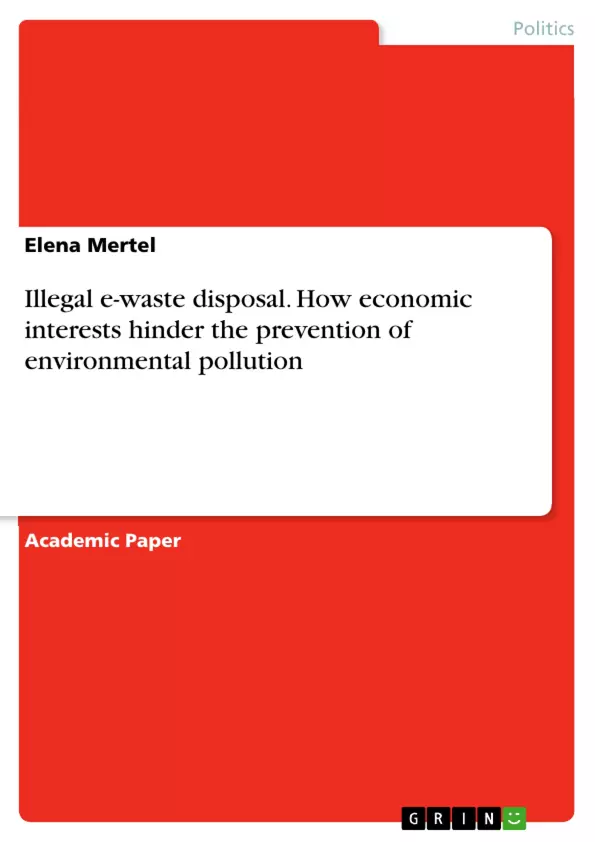This paper is about the interplay between environmental gains and economic interests. It shows the effectiveness of the EU's efforts to fight pollution caused by wrongful e-waste disposal. Accordingly, it contributes to the ongoing debate on the significance of international political economics for environmental policy-making processes. Environmental pollution caused by massive amounts of electronic waste generated all over the globe has become a major issue on the politico-environmental agenda. This is due to the fact that electronics have a high material composition of hazardous components. The toxins present in electronic waste are multifarious and have devastating impacts on both public health and the environment in the areas of wrongful disposal.
What is striking, even though economically developed countries clearly produce the highest amount of e-waste, those who suffer are often located in economically less developed areas in Africa and South Asia. Therefore, finding solutions to the ever-growing need for sustainable e-waste disposal raises the question on how to approach the problem. The EU is acknowledged to play a pioneering role in addressing the issue by having established a legislative framework, having the highest collection rates of e-waste and the most detailed data on e-waste flows. However, it is also the second-largest producer of e-waste around the world and with an overall collection rate of 35 percent far from having solved the problem.
In contrast to those countries directly affected by pollution, the European member-states have the infrastructure, scientific and technical capabilities to both guarantee a duly disposal and reduce the emergence of e-waste in the first place. In this regard, it remains questionable whether the measures taken are in fact as sufficient as generally perceived.In order to analyze this, there are several points of departure. With the focus on environmental efficiency it is acknowledged that environmental goals are not stable but subject to change which complicates the evaluation of measures taken. A more promising approach, therefore, lies in examining how the operating regime aims to counter negative environmental effects. In shedding light on social, historical and economic dynamics present in international political decision-making processes it is possible to get a better understanding of the actual effectiveness of an international regime under given circumstances.
Inhaltsverzeichnis (Table of Contents)
- Introduction
- Theoretical Framework
- International Regimes
- Post-Positivist Approaches on Regime Effectiveness
- Concepts
- Sustainable Development
- Precautionary Principle
- Methodology
- Main Analysis
- E-waste Generation
- Electronics on the Market
- E-waste Disposal
- Conclusion
Zielsetzung und Themenschwerpunkte (Objectives and Key Themes)
This research paper explores the effectiveness of European Union regulations aimed at preventing environmental pollution caused by illegal e-waste disposal. It examines the interplay between environmental gains and economic interests within the EU's efforts to fight e-waste pollution. By analyzing the full life cycle of electronic devices, the paper investigates the impact of existing economic drivers on the capabilities of implemented regulations.
- Effectiveness of EU e-waste regulations
- Interplay between environmental goals and economic interests
- Impact of economic drivers on e-waste management
- Role of the precautionary principle and sustainable development
- Analysis of e-waste generation, market circulation, and disposal
Zusammenfassung der Kapitel (Chapter Summaries)
The paper begins with an introduction that outlines the global e-waste problem, highlighting the EU's significant role in e-waste generation and collection. It raises the question of whether the EU's measures to address e-waste are sufficient, particularly given the conflicting objectives of economic growth and environmental protection. The paper then delves into the theoretical framework, reviewing post-positivist approaches on regime effectiveness and constructivist perspectives on economic interests within environmental policy.
The concepts section introduces key theoretical concepts relevant to the analysis, including sustainable development and the precautionary principle. These concepts are presented as important lenses through which to understand the challenges of balancing environmental and economic objectives in e-waste management.
The main analysis is divided into three sections that correspond to the full life cycle of electronic devices: e-waste generation, electronics on the market, and e-waste disposal. Each section examines the impact of economic drivers on the effectiveness of EU regulations within each stage of the product life cycle.
Schlüsselwörter (Keywords)
The paper focuses on the keywords and topics such as e-waste, environmental pollution, EU regulations, economic interests, sustainable development, precautionary principle, regime effectiveness, constructivist approaches, full life cycle, circular economy model, and international political economics.
Frequently Asked Questions
How effective are EU regulations regarding e-waste?
While the EU has a detailed legislative framework, the paper questions its sufficiency as collection rates remain around 35%, and economic interests often hinder environmental goals.
Who suffers most from wrongful e-waste disposal?
Although developed countries produce the most e-waste, economically less developed areas in Africa and South Asia suffer the most from the resulting pollution and health impacts.
What is the "precautionary principle" in this context?
It is a strategy to manage risks where scientific understanding is incomplete, suggesting that preventive action should be taken to avoid environmental damage from hazardous electronics.
How do economic interests hinder environmental protection?
Economic drivers prioritized over sustainability can lead to illegal exports and insufficient recycling processes because proper disposal is often more costly than dumping.
What is the significance of the "full life cycle" analysis?
Analyzing the full life cycle—from generation to market and disposal—allows for a better understanding of where regulations fail due to economic pressures at each stage.
- Quote paper
- Elena Mertel (Author), 2018, Illegal e-waste disposal. How economic interests hinder the prevention of environmental pollution, Munich, GRIN Verlag, https://www.grin.com/document/498135



